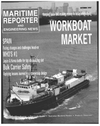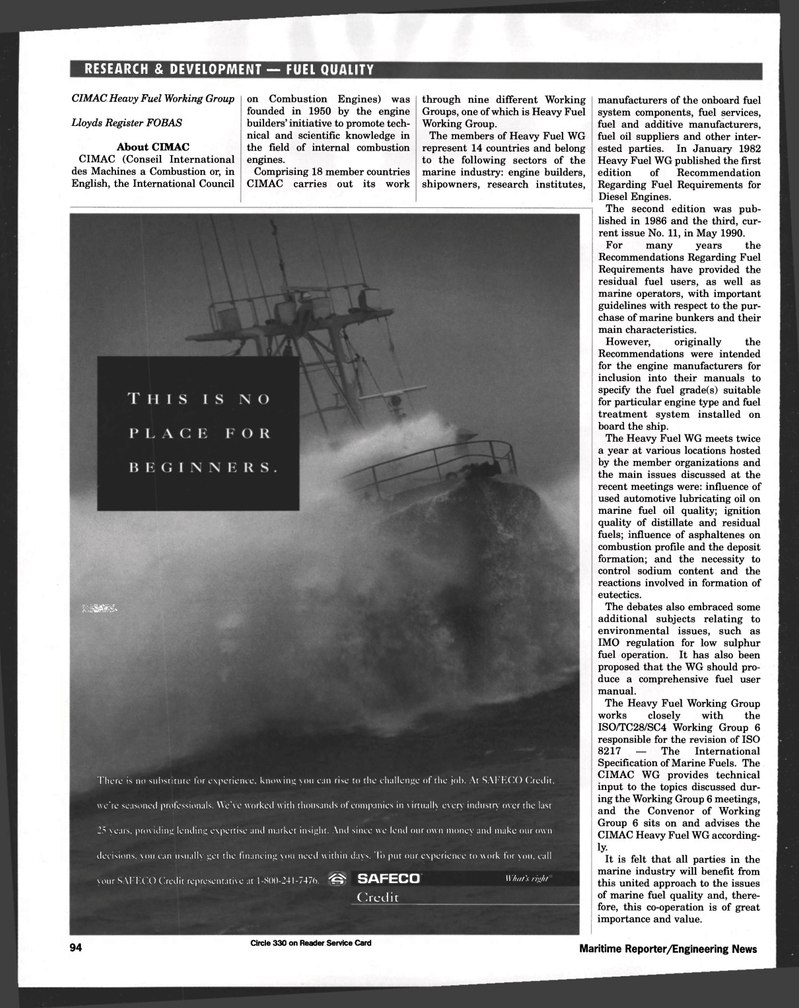
Page 84: of Maritime Reporter Magazine (October 1997)
Read this page in Pdf, Flash or Html5 edition of October 1997 Maritime Reporter Magazine
RESEARCH & DEVELOPMENT — FUEL QUALITY
CIMAC Heavy Fuel Working Group
Lloyds Register FOBAS
About CIMAC
CIMAC (Conseil International des Machines a Combustion or, in
English, the International Council on Combustion Engines) was founded in 1950 by the engine builders' initiative to promote tech- nical and scientific knowledge in the field of internal combustion engines.
Comprising 18 member countries
CIMAC carries out its work through nine different Working
Groups, one of which is Heavy Fuel
Working Group.
The members of Heavy Fuel WG represent 14 countries and belong to the following sectors of the marine industry: engine builders, shipowners, research institutes, itel ,
There is no substitute for experience, knowing you can rise to the challenge of the job. At SAFECO Credit, we're seasoned professionals. We've worked with thousands of companies in v irtually every industry over the last 25 years, pro\ iding lending expertise and market insight. And since w e lend our own money and make our own decisions, you can usually get the financing you need within days. To put our experience to work for you, call your S M-'KCO Credit representative at 1-800-241-7476. SAFECO
Credit 11 'hat 's right 94 Circle 330 on Reader Service Card manufacturers of the onboard fuel system components, fuel services, fuel and additive manufacturers, fuel oil suppliers and other inter- ested parties. In January 1982
Heavy Fuel WG published the first edition of Recommendation
Regarding Fuel Requirements for
Diesel Engines.
The second edition was pub- lished in 1986 and the third, cur- rent issue No. 11, in May 1990.
For many years the
Recommendations Regarding Fuel
Requirements have provided the residual fuel users, as well as marine operators, with important guidelines with respect to the pur- chase of marine bunkers and their main characteristics.
However, originally the
Recommendations were intended for the engine manufacturers for inclusion into their manuals to specify the fuel grade(s) suitable for particular engine type and fuel treatment system installed on board the ship.
The Heavy Fuel WG meets twice a year at various locations hosted by the member organizations and the main issues discussed at the recent meetings were: influence of used automotive lubricating oil on marine fuel oil quality; ignition quality of distillate and residual fuels; influence of asphaltenes on combustion profile and the deposit formation; and the necessity to control sodium content and the reactions involved in formation of eutectics.
The debates also embraced some additional subjects relating to environmental issues, such as
IMO regulation for low sulphur fuel operation. It has also been proposed that the WG should pro- duce a comprehensive fuel user manual.
The Heavy Fuel Working Group works closely with the
ISO/TC28/SC4 Working Group 6 responsible for the revision of ISO 8217 — The International
Specification of Marine Fuels. The
CIMAC WG provides technical input to the topics discussed dur- ing the Working Group 6 meetings, and the Convenor of Working
Group 6 sits on and advises the
CIMAC Heavy Fuel WG according- ly.
It is felt that all parties in the marine industry will benefit from this united approach to the issues of marine fuel quality and, there- fore, this co-operation is of great importance and value.
Maritime Reporter/Engineering News

 83
83

 85
85
